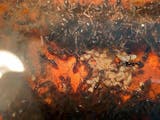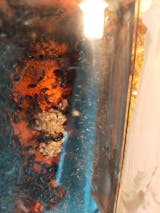Product Description
Species Overview
Leptogenys kitteli, commonly known as the Kiwi’s Jaw Ant, is an exceptional ponerine species admired for its army ant-like raiding behavior and coordinated predatory tactics. Native to southern China and Southeast Asia, this species features a slender, dark body, long sickle-shaped mandibles, and large, expressive compound eyes that grant it remarkable hunting precision. These ants are obligate carnivores displaying complex group coordination rarely seen outside of true army ants.
Natural Habitat & Behavioral Characteristics
In nature, Leptogenys kitteli nests within humid tropical forests, often under rotting logs, stones, or shallow soil chambers. They are nomadic predators, forming marching columns to hunt in unison — a behavior strongly reminiscent of army ants. One of their most fascinating traits is their tendency to hang from nest ceilings, creating living curtains of clustered workers for cohesion and defense. When disturbed, they can produce subtle hissing or stridulating sounds, a rare form of communication among ants.
Comprehensive Keeping Guidelines
Optimal Habitat Configuration
-
Nest Type: Plaster or concrete nests with textured ceilings or hanging supports to allow natural clustering.
-
Temperature: Maintain 20–30°C (68–86°F) with minimal fluctuations.
-
Humidity: Keep moderate to high humidity (70–85%) to simulate their natural rainforest environment.
-
Foraging Area: Provide smooth, escape-proof surfaces or apply anti-escape barriers properly.
Nutritional Requirements & Feeding Protocol
-
Primary Diet: Strictly carnivorous — feed live or pre-killed insects such as crickets, roaches, and earthworms.
-
Supplemental Nutrition: No sugar water required — protein-based diets are essential for brood development.
-
Feeding Frequency: Feed every 2–3 days, removing leftovers promptly to prevent mites or mold.
Special Care Considerations
-
Swarm Hunting Behavior: Observe their spectacular group hunting formations, which are both educational and fascinating.
-
Cluster Hanging: Ensure your nest supports ceiling-hanging behavior to promote colony well-being.
-
Experience Level: Recommended for intermediate to advanced keepers due to humidity and stability requirements.
Important Acclimation Information
This species is sensitive to transit and environmental change. Allow 1–2 weeks for acclimation in a quiet, shaded environment. Minor worker loss during this period is normal. Maintain stable humidity and minimize vibration.
Our Guarantee
- ✅ 100% Healthy Fertilized Queen Ants
- ✅ Free Replacement or Refund If Queen Arrives Deceased Due to Shipping
Responsible Keeping Notice
Leptogenys kitteli is a specialized predator possessing a defensive sting. Handle carefully and never release colonies into non-native environments. Intended for responsible, experienced enthusiasts only.
SEO Keywords
Leptogenys kitteli, Kiwi’s Jaw Ant, army ant behavior, predatory ants, marching ants, exotic ants, live ant colony, AntNook.







